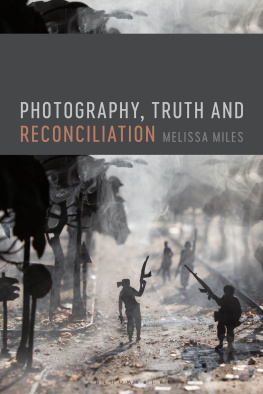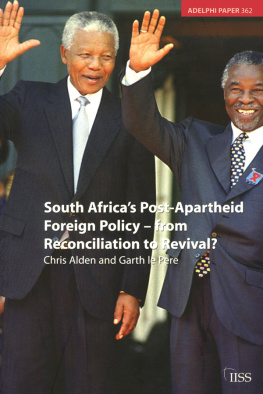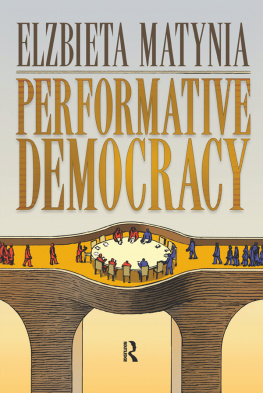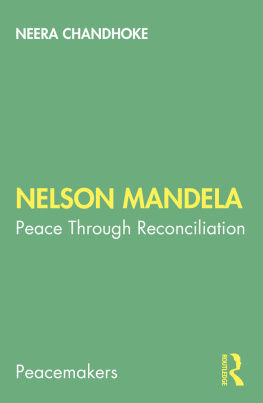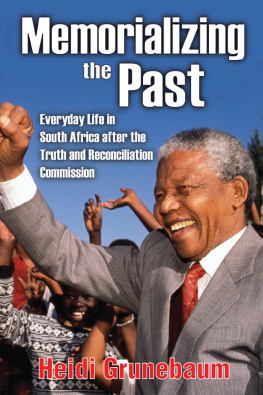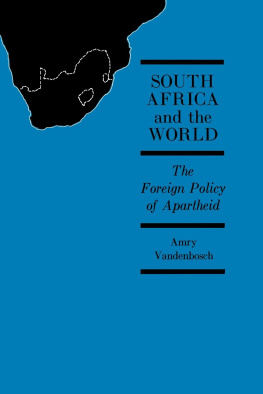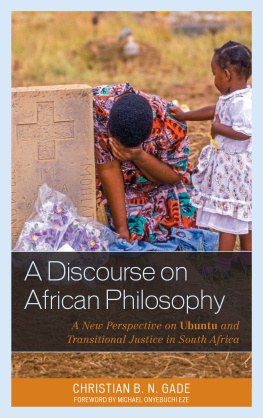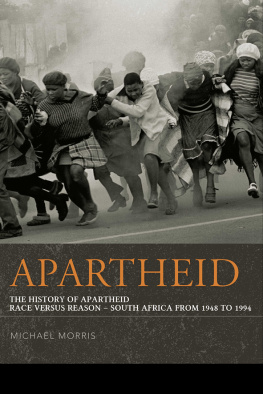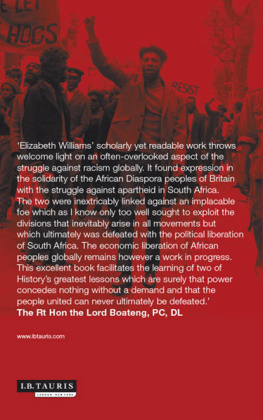STAGING SOLIDARITY
THE YALE CULTURAL SOCIOLOGY SERIES
Jeffrey C. Alexander and Ron Eyerman, Series Editors
PUBLISHED
Triumph and Trauma, by Bernhard Giesen (2004)
Myth, Meaning, and Performance: Toward a New Cultural Sociology of the Arts, edited by Ron Eyerman and Lisa McCormick (2006)
American Society: A Theory of Societal Community, by Talcott Parsons, edited and introduced by Giuseppe Sciortino (2007)
The Easternization of the West, by Colin Campbell (2007)
Culture, Society, and Democracy: The Interpretive Approach, edited by Isaac Reed and Jeffrey C. Alexander (2007)
Changing Men, Transforming Culture: Understanding the Mens Movement, by Eric Magnuson (2007)
Do We Need Religion? On the Experience of Self-Transcendence, by Hans Joas (2007)
A Contemporary Introduction to Sociology: Culture and Society in Transition, by Jeffrey C. Alexander and Kenneth Thompson (2008)
Staging Solidarity: Truth and Reconciliation in a New South Africa, by Tanya Goodman (2008)
Inside Jihadism: Understanding Jihadi Movements Worldwide, by Farhad Khosrokhavar (2008)
Meaning and Method: The Cultural Approach to Sociology, by Isaac Reed and Jeffrey C. Alexander (2009)
Performative Democracy, by Elzbieta Matynia (2009)
FORTHCOMING
Injustice at Work, by Franois Dubet (2009)
STAGING SOLIDARITY
TRUTH AND RECONCILIATION IN A NEW SOUTH AFRICA
by
Tanya Goodman
First published 2009 by Paradigm Publishers
Published 2016 by Routledge
2 Park Square, Milton Park, Abingdon, Oxon OX14 4RN
711 Third Avenue, New York, NY 10017, USA
Routledge is an imprint of the Taylor & Francis Group, an informa business
Copyright 2009, Taylor & Francis.
All rights reserved. No part of this book may be reprinted or reproduced or utilised in any form or by any electronic, mechanical, or other means, now known or hereafter invented, including photocopying and recording, or in any information storage or retrieval system, without permission in writing from the publishers.
Notice:
Product or corporate names may be trademarks or registered trademarks, and are used only for identification and explanation without intent to infringe.
Library of Congress Cataloging-in-Publication Data
Goodman, Tanya.
Staging solidarity : truth and reconciliation in a new South Africa / Tanya Goodman.
p. cm.
Includes bibliographical references and index.
ISBN 978-1-59451-285-8 (hardcover : alk. paper) ISBN 978-1-59451-286-5 (paperback : alk. paper)
1. South Africa. Truth and Reconciliation Commission. 2. ReconciliationPolitical aspects
South Africa. 3. South AfricaPolitics and government1994 I. Title.
DT1974.2.G66 2009
968.06dc22
2008039211
Designed by Straight Creek Bookmakers.
ISBN 13: 978-1-59451-285-8 (hbk)
ISBN 13: 978-1-59451-286-5 (pbk)
Contents
I have been extremely fortunate to benefit from the influence of a number of people, and I thank the following: Kai Erikson for his wisdom, warmth, and insistence that I tell the story; Jeff Alexander for arriving at Yale at a critical time in my trajectory, reigniting my commitment to the discipline, and shining a light on my research path; Phil Smith for his pragmatic approach, sense of humor, and precise critiques; and Debora Paterniti for nurturing my interest in sociology and recognizing the potential of my project in its infancy.
Much of the research I conducted in the field would not have been possible without the fellowships and financial assistance I received from the Yale Center for International and Area Studies and the Schell Center for International Human Rights at Yale Law School. The Schell Center funding during the summers of 1997 and 1998 enabled me to do internships at two different nongovernmental organizations in South Africathe Human Rights Committee (HRC) and the Centre for the Study of Violence and Reconciliation (CSVR). My time with them not only served to sharpen my analysis of the TRC and refine my research project but also provided opportunities for significant intellectual and social interaction. I am also especially grateful to Beth Davis at Paradigm for her encouragement and enduring tolerance in helping me make this book a reality during a most challenging period in my personal life.
This journey could not have been made without the encouragement, harassment, love, and support of my family. I am, as always, grateful to my parents, Basil and Carol-Lee, for setting me on a course that created the opportunities to make this journey possible; to my brother, Ryan, for persuading me to begin this particular journey and inspiring me with his passion and intellectual commitment; to my partner, Charl, for accompanying me on this and other journeys with patience (and occasional impatience), enchantment, and the promise of new adventures; and to Tessa and Pierre, whose arrival in my life motivated me to bring this project to fruition.
Tanya Goodman
South Africa belongs to all who live in it, black and white. Our country will never be prosperous or free until all our people live in brotherhood.
The Freedom Charter of the ANC Adopted at the Congress of the People, Kliptown (June, 26 1955)
We must clearly demonstrate our goodwill to our white compatriots and convince them by our conduct and arguments that a South Africa without apartheid will be a better home for all. No men or women who have abandoned apartheid will be excluded from our movement towards a nonracial, united and democratic South Africa.
Nelson Mandelas speech in Soweto after being released from prison (February 13, 1990)
Our Vision: A South Africa that is a home to all its people. This vision is inspired by the following words by Albert Luthuli (1962): South Africa is not yet home for all her sons and daughters. There remains before us the building of a new land, a home for [people] who are black, white, brown, from the ruins of the narrow groups, a synthesis of the rich cultural strains which we have inherited.
Home for All campaign launched by white South Africans (December 16, 2000)
Despite decades of race-based oppression and state-sanctioned violence, the African National Congress (ANC), the primary antiapartheid political movement, retained its commitment to a nonracial, democratic South Africa as set out in its foundational document, the Freedom Charter (1955). This was evidenced when, upon his release from prison in 1990 after twenty-seven years, Nelson Mandela publicly endorsed and reaffirmed the ANCs commitment to the ideal of inclusion, whereby South Africa would be a home, as the Freedom Charter had promised, to all who live[d] in it (Mandela 1990). But for many years, blacks and whites had been socially, politically, and physically separated, often by violent means such as murder, detention, and abuse. How was it possible that in December 2000, ten years after Mandelas release, a group of white South Africans could come together and sign a declaration called the Home for All, marking their agreement with the ANCs vision of inclusion? After many years of segregation and repression, how did black and white South Africans arrive at the point of constructing a sense of social solidarity whereby they could see themselves sharing a home, living together as members of the same moral and national community?


